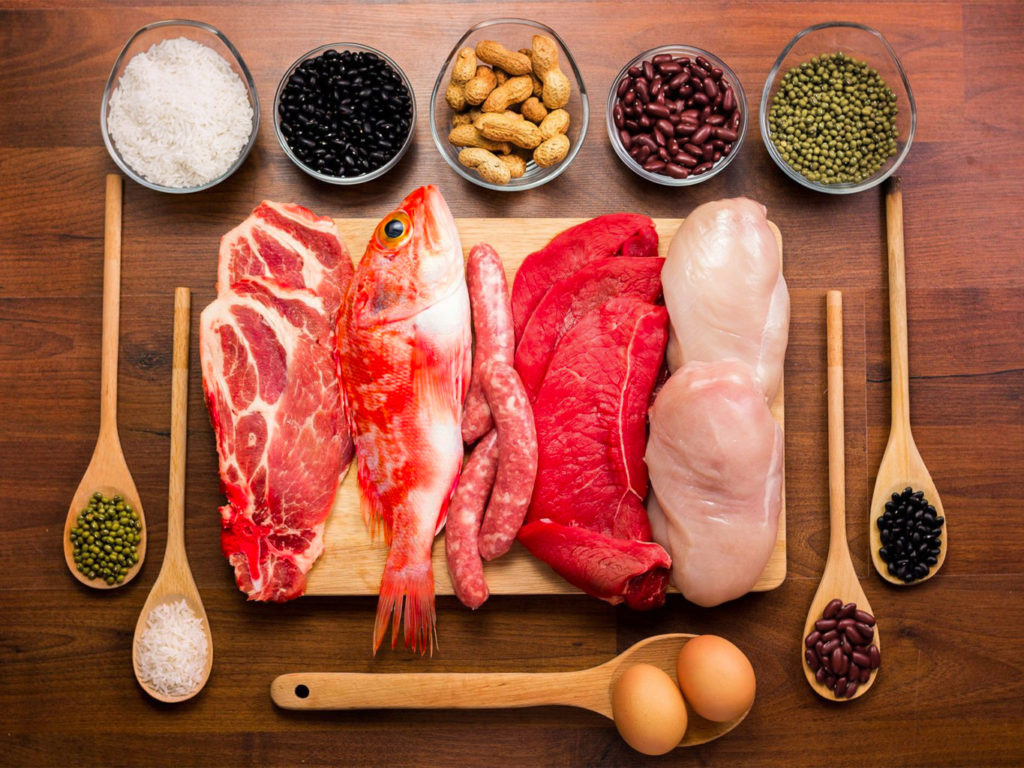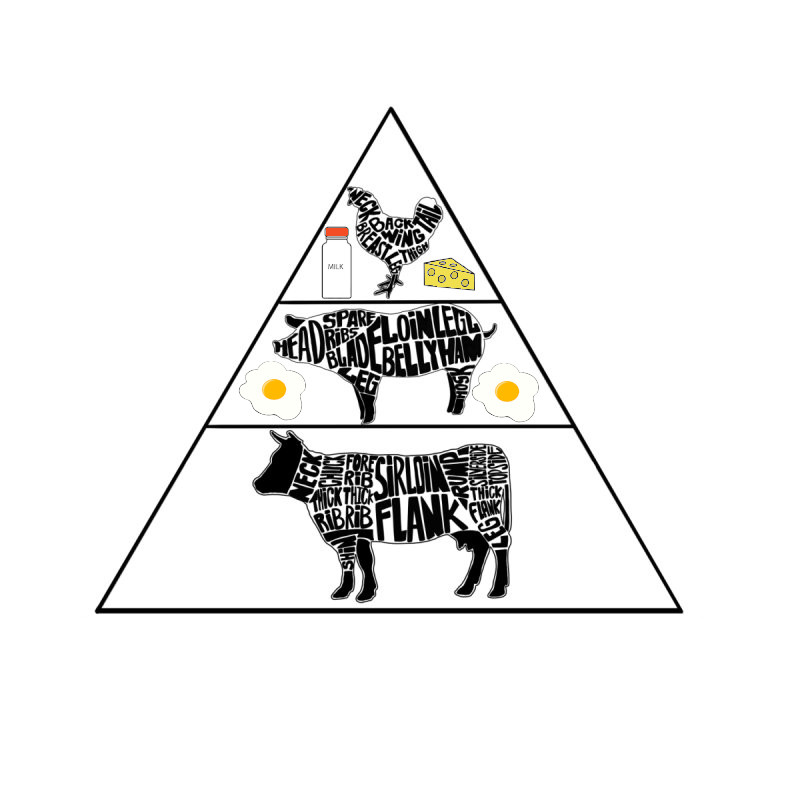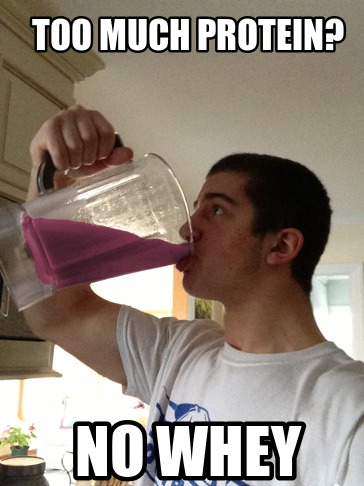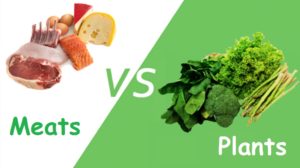Proteins are necessary components of the larger molecular flesh machines.
S.T.

Moo. Oink. Cluck. Gurgle. Thud. A bean is born. Protein. The most beloved of all macro nutrients. The one nutrient everyone can agree upon. A single nutrient everyone consumes in unison. The biggest make-up of the human body is protein. Unless you are grossly obese then fat wins. Protein is the nutrient responsible for all the wonderful things in our bodies. From skin to hair to enzymes to muscles. The bodybuilder wears it like a suit of armor.
Protein is championed by everyone for everyone. From the mighty athlete at the peak of the game to the grandma in a walker fighting off muscle wasting from age. Bipedal plant-eaters and bipedal meat-eaters agree that protein unites us all. Where the protein comes from is the point of contention between bipedals. How much protein do you eat and what is the quality? Where does it come from and is there a difference between types of protein? Time for a deep dive, hold your breath.

Protein
Meat, eggs and dairy. These are the primary source of protein most people assume when they hear protein. Anything that comes from an animal is based in protein. Where do herbivorous animals get their protein then? From the plants themselves mostly. Plants do contain protein but in varied amounts. Can you only eat plants and achieve your protein requirements? Maybe. Read on.
Protein is the building block of many tissues and enzymes in the body. Several organs are made of protein. Proteins for hormones. Not counting water up to 75% of you is protein. We do not store protein in the body except in the form of muscles and organs. If you do not eat enough in a day to maintain what you have or put more on you, then you will eat yourself. Self cannibalism. That is how important and necessary protein is.
Proteins are long chains of amino acids. Amino acids are what build the muscle and enzymes in the body. There are 9 essential amino acids the body cannot make. The body must receive these from an outside source. These 9 amino acids are what defines a high- or low-quality protein. These terms are misleading however. A better term is a complete or incomplete protein. Different proteins are made of different amino acids.
Do Plant And Meat Proteins Provide The Same Quantity?
Muscle meat and dairy are similar in types of proteins. Their amino acids are different in proportions, however. The main factor in these complete proteins is that all 9 amino acids are present in amounts that would nourish the body. Spinach also has proteins, but its ratio of amino acids is vastly different. In spinach, a few amino acids are very low. In fact, the numbers are so low that to get a complete array of the essential amino acids you would need to eat 5 pounds of spinach a day. Can you even eat 5 pounds of food in a day let alone of spinach? This is why herbivores eat all day, it is to get adequate amounts of nutrients and amino acids from the plants they eat.
Plant foods lack certain amino acids. That is why they are called incomplete proteins. Most would tout that beans and nuts are the highest source of protein among plant foods and that is true, but they still lack some amino acids in a quantity that would make a difference. Others may say that protein combining is the key. This is a method by which you eat different food together, such as beans and whole rice, to get a more complete array of amino acids.
This works well, but can it provide you with enough depending on your goals? If you are on the lower end of the protein requirements, you might be able to get away with eating less protein than someone who is more active. Being on the lower end means you are sedentary, doing very little physical activity.
An Inefficient Fuel.
Protein is a fuel source, but an inefficient one. Protein can breakdown and form glucose, a type of sugar, in the body. Unlike exogenous sugars, glucose from protein will not use insulin in the same manner. Insulin shuttles glucose into the cells when blood glucose levels rise. This glucose from protein is made in the exact amounts needed by the tissues asking for it. This process is very energy intensive and the body is not a fan of doing it for all the glucose requirements. It is so disliked by the body that you can run into what is called “rabbit starvation” if all you eat is protein.
Rabbit starvation is named after rabbits who are very lean and low in fat. In theory this sounds ok, but in practice it is horrific. Bipedals who only eat rabbits eventually find themselves in a situation where their hunger cannot be satisfied. They may eat 2 pounds of meat in a sitting and still be hungry. They can suffer from diarrhea and other maladies. This is what happens if you only eat protein without a fuel source. Do not use protein as a fuel all the time..

How Much To Eat?
Protein is used to pack on muscle. Bodybuilders would eat several servings of protein to build more muscle mass. In fact most bipedals snatch, chomp and guzzle down protein in all forms. How much protein is too much? What is the necessary amount? The RDA states that 98 grams of protein is enough for one day or .8g/kg. This is to prevent malnutrition, not to reach optimal functioning. Others suggest things such as 1 g/kg. That means a 200-pound man roughly eats 98 grams a day. These values don’t consider physical activity nor the breakdown of protein. Others say a 7-ounce serving a day is enough. If you want malnourishment, go eat 7 ounces or less a day of protein.
For repair purposes others have postulated 1.2g/kg and to build muscle 1.5-2g/kg.
Some people freak out at eating a higher protein diet. MY KIDNEYS! I’LL DIE! Concerns arise about kidney failure and other horrid things. Here is the truth. Up to 4g/kg a day of protein showed no harmful effects. The kidneys were fine. The fear of kidney failure comes from patients in acute or chronic kidney failure need to avoid protein. This matters to them because they cannot filter out the byproducts such as urea that forms from ammonia. Too much of that circulating in your body for days is killer.
A normal person with functioning kidneys will do fine eating a little more protein depending on your goals.
As an aside, a bodybuilder who doesn’t eat any animal products, aka plant based, needs to supplement with protein powder in the form of pea protein or other sources. If that is what you want no problem, but there are two things to consider. In this post food is defined as found in nature as is. Pea protein is a processed food that goes through who knows what to become this thing. It is preferable to only eat real food.

When Is Plant Protein Enough?
The main point is that if you are looking to build or maintain muscle, regardless of whether you are a body builder or not, you need more protein. 7 ounces of protein a day is ok if all you do is sit in an office and sit at home tweeting and updating your status. A diet devoid of animal products makes it harder to supply enough protein from real food to those in more active lifestyles.
Expecting plants to give you all the protein requirement you need in a day, requires a few situations. Being sedentary at home watching the latest show or surfing social media for the next viral thing require less protein. Compare this to someone who works out at the gym three days a week cycling and lifting weights. The second scenario requires more. Protein needs are based on activity level. More activity means more protein.
Another point is age. Sarcopenia is the loss of muscle mass as one ages. This is due in part to lower metabolic efficiency. Meaning that protein is harder to digest and utilize. As such, an older person has a higher protein requirement to stave off muscle loss. A younger person can do better than an older person on a low protein diet. An older active adult will need much more than a younger couch surfer. This is not to downplay those who follow plant-based diets, rather it is to make you aware that protein needs differ based on activity. Avoid undernourishment.

Are Plant And Animal Proteins Unique?
Plant proteins and animal proteins are not the same. They do not digest in the same manner. Take gluten as an example. Gluten, a protein, can damage the wall of the intestines. Egg or muscle protein does not do so. Milk can cause issues based on the casein subtype or if the dairy is raw or pasteurized. Even within milk there are two proteins that are digested differently. Whey and casein. Whey is absorbed and used rapidly. Casein, another protein molecule, sits in the digestive system longer slowly diffusing itself into your body.
Muscle meat, dairy, and eggs as well, are all protein that causing an anabolic reaction. Anabolism is where the body builds up on itself. Muscle building from exercise is one example. Part of this is due to an insulin rise from specific amino acids. Notice once again, specific amino acids cause this. Not every amino acid. Once again different proteins act differently in the body.
Collagen is another type of protein useful in preserving tissues like skin and joints. Collagen is hardly found in plants at all. The amino acid glycine, found abundantly in animals, is an essential amino acid that can cause problems if deficient. Glycine is produced in the body, but in low amounts. Glycine is not found in plants easily. Unless one consumes superfluous amounts getting enough glycine is difficult. Once again the quantities are very low in plants. Glycine is needed for other function in the body besides joint repair and making skin look radiant and beautiful. Glycine in the absence of other amino acids, like methionine, will also cause more long term issues.
What Is Right For Me?
The moral of the story is protein is important and not all protein acts the same in the body. As mentioned, protein consumption depends on your goals and upon your morals. Should you choose to build muscle, know the pitfalls and make sure you eat enough. A plant-based person, or one who is thinking of transitioning needs to know about the specific pitfalls that can occur. If you choose that path, ensure you take in what you may be lacking in one way or another. More on this in the future. No matter what your way of eating is, protein is important and necessary part of the diet. Eat enough of it to make it through life.
